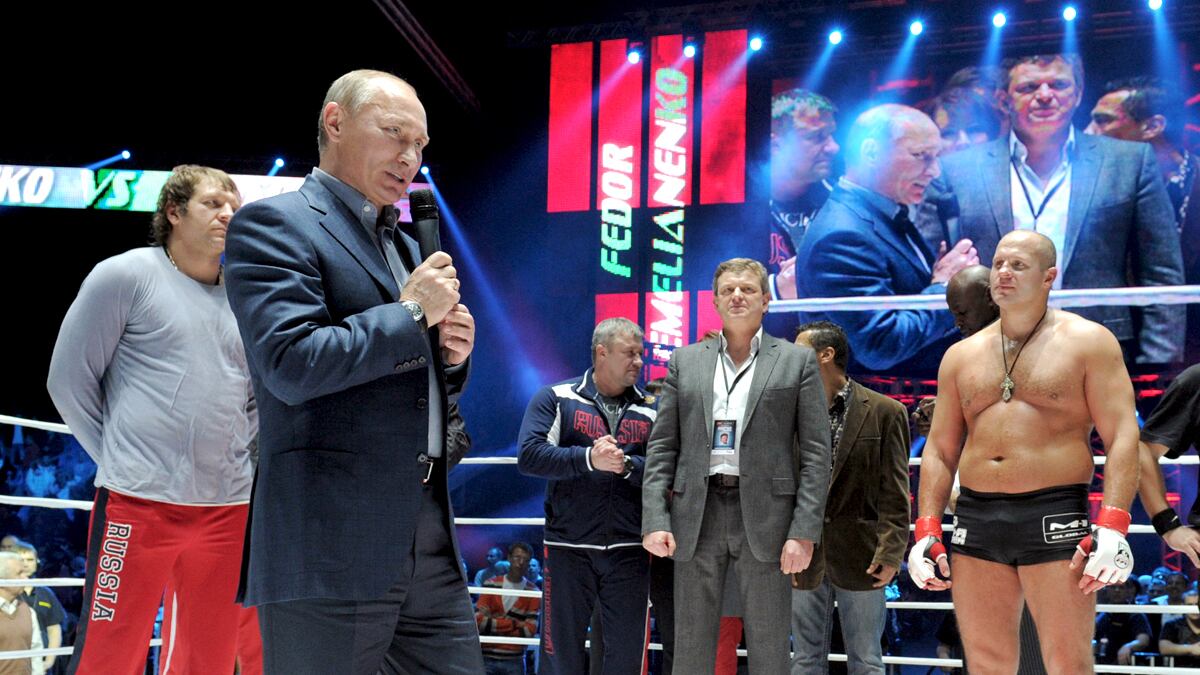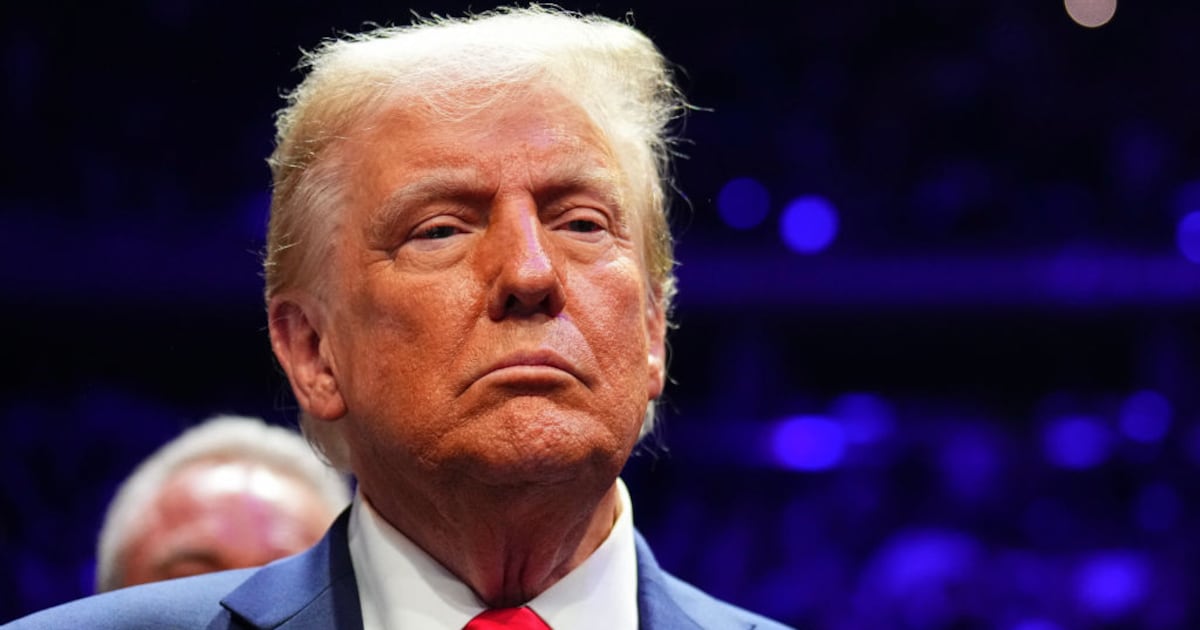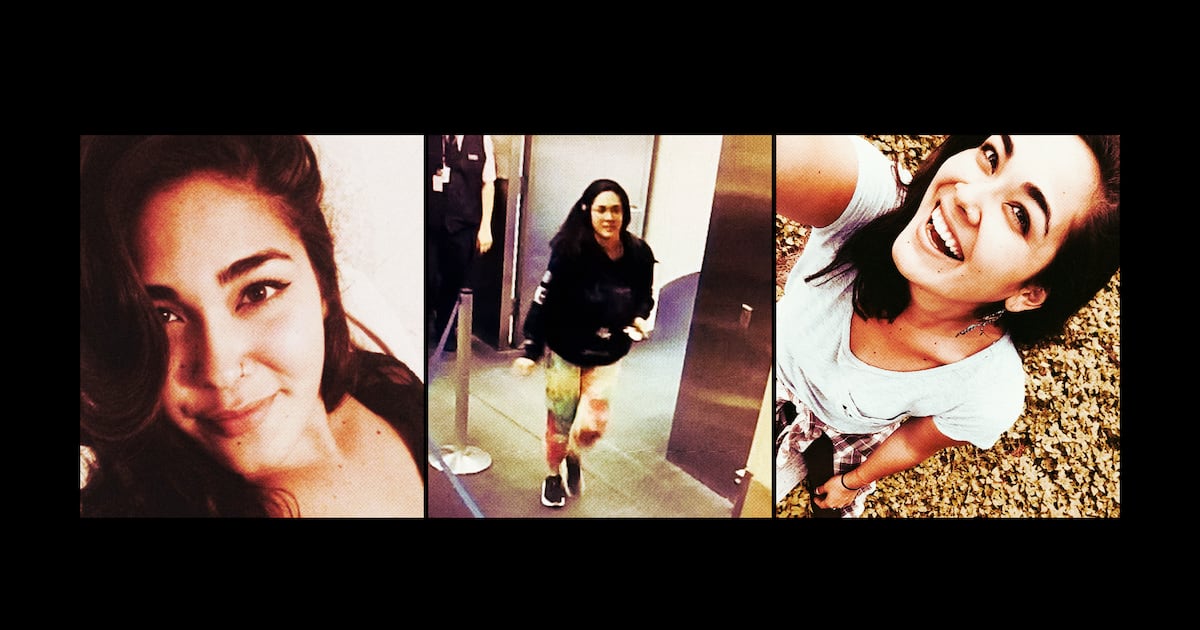On paper, they should have been Putin’s people: a stadium full of pumped-up, macho Russian martial arts fans gathered to watch a Russian fighter knock the daylights out of an American challenger. But when Russia’s former President and current Prime Minister Vladimir Putin climbed onto the blood-spattered ring at Moscow’s Olympic Stadium up to address the crowd Sunday night he was met with a chorus of boos, catcalls and whistles. Putin, visibly taken aback by the reaction, launched into a congratulatory speech for the mixed martial arts fight’s winner, Fedor Emelianenko. “You are a real Russian knight, Fedya,” Putin told the sweat-covered fighter as his American opponent Jeff Monson was helped out of the arena with a broken leg—with sporadic jeering and booing continuing all through Putin’s speech.
Video of Putin’s humiliation was broadcast on YouTube and clocked up a million and a half views in a matter of hours Russia’s Channel 2 state television, whose news bulletins are dominated by adulatory Soviet-style reports about what Putin has been up to that day, broadcast an unedited version of the fiasco apparently by mistake—but quickly switched to a censored version, with catcalls removed, in later bulletins.
Putin’s spin-doctors came up with a variety of explanations of the booing—from anger at lack of access to toilets during the speech to abuse directed toward the departing Monson. None made much sense. Sports journalists who attended the event reported that Monson was cheered as he was helped out of the ring—just before Putin entered it—and a flood of posts on the American fighter’s Facebook page have been overwhelmingly supportive. “We, Russian, don’t boo a men which lost a fair fight. It’s not in our culture,” wrote Alexey Fedorov. “Press Service of the PM humiliated Russian people not you.”
ADVERTISEMENT
In Putin’s Russia, where the media have been brought tightly under the Kremlin’s control and the electorate is fed with a steady TV diet of adulation for the great leader, this kind of thing isn’t supposed to happen. Putin is well-known for his macho publicity stunts, from posing bare-chested in the Siberian steppe to shooting tigers, harpooning whales and riding motorcycles. But there are signs that the public is growing tired of these escapades. Last year a camcorder video of Putin test-driving a new ecologically friendly car in Russia’s Far East became another YouTube hit—because Putin’s little car was followed by a cortege of at least fifty Mercedes limos, security trucks and two ambulances. The ribald and expletive-laden commentary by the group of regular blokes who shot the video is telling—their friendly ribbing of “Vova” Putin as he whizzes by turns to a tirade of insults as his security detail passes, followed by a string of limousines bearing local bigwigs.

Up till now, Putin has been remarkably adept at playing the Good Tsar—making a point of publicly berating incompetent ministers and bureaucrats—while deflecting criticism for Russia’s rampant corruption, crummy public services and regular negligence-driven disasters. His carefully cultivated tough-guy image is designed to make him seem the man that the Russian everyman wants to be. Russians may be disgruntled with just about every aspect of their government—the police are distrusted by 78% of the population and a whopping 99% of respondents in a recent poll said they didn’t believe officials’ income declarations—but so far Putin’s popularity ratings have held up. Now, with Putin set to return for a third term as President in 2012, that invincible popularity seems to be eroding. Suddenly, it seems, Russian everymen aren’t so thrilled by their once and future Tsar.
“This is the end of an era,” wrote anticorruption campaigner Alexei Navalny, a popular Russian blogger of Putin’s boxing-ring humiliation. "Why does he think that if people like boxing matches, they like crooks and thieves?” Navalny’s term for Putin’s United Russia Party—“the Party of Crooks and Thieves”—has become so ubiquitous that when political posters appeared in the Siberian city of Krasnoyarsk last month simply denouncing “Crooks and Thieves” a local court banned them as an attack on the ruling party. The most recent polls show support for United Russia running at around 51% in the run-up to parliamentary elections in December—despite massive publicity campaigns and the resources of the state backing the lackluster party - with Putin’s own approval rating running at 61%.
In practice, no amount of booing will change the fact that thanks to Kremlin control of the media and the ballot boxes, it’s a safe bet that United Russia will still dominate Parliament and that Putin will win the Presidential election next year. What’s changed, though, is that it’s becoming increasingly obvious that ordinary Russians—not just the constantly griping metropolitan intelligentsia but ordinary boxing fans—are increasingly discontented by the corruption and thieving of Russia’s ruling class. Last month, United Russia officials were booed off a stage by angry rock fans. Now, Putin’s been booed by his own macho grassroots. And as several Russian rulers of the past have found to their cost, if you don’t have the Russian muzhik—regular guy—behind you, Russia quickly becomes a difficult place to rule.





